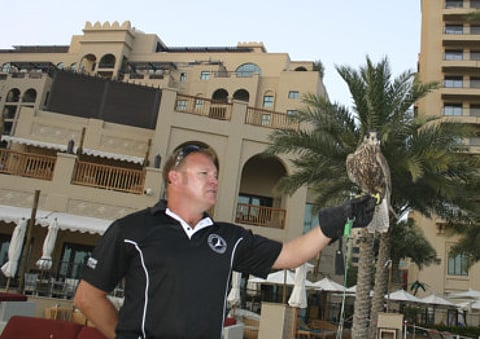Setting the falcon among the pigeons
An ancient Arabian predator-prey relationship solves bird pest problems in UAE buildings, finds Features Writer Cheryl Robertson

Marley is as quiet as a mouse as he sits on falconer Peter Bergh’s gloved hand. Once the calming hood is removed though, he’s alert and, taking off into the oncoming breeze, soars around the hotel performing the role he was contracted for.
His job is to scare crows and pigeons from roosting in buildings and at the same time ensures everything including the windows are free from bird droppings. Dubai’s ornate Arabian-style architectural intricacies, structures, ledges and over hangs have made it one of the UAE’s most pigeon-roost friendly cities, says Bergh, owner of Royal Shaheen Events.
“Overall the falcons are scarecrows rather than hunters,” he says, for they don’t kill the pigeons at any facility he services, despite them being the bird of prey’s favourite food. “The falcon provides a presence, preventing any new birds from coming into the area and settling in. The pigeon or crow feels uncomfortable and vulnerable with a prime predator so close by.”
Killing the homing instinct
The falcon doesn’t kill crows or pigeons because it knows from previous experience that it would get food far more easily from the handler.
The company provides a feral bird control service to hotels and other industries to help combat the problems that arise when large flocks move in and take over. “Birds are creatures of habit, and the number one problem with pigeons is their homing instinct. So we create havoc by destabilising them and they go and roost elsewhere,” says Bergh.
Regular maintenance — flying a peregrine or saker falcon three to five times a week for half an hour — is all that is required in a building that has controlled its bird infestation. For heavy infestations, Royal Shaheen also trap and relocate birds, clear nest sites and pigeon-proof key breeding and roosting sites within the scope of the UAE environmental laws, says Bergh.
Gary Gray, Operations Manager, FM, Dubai Sports City, says, “For most of the buildings that have problems, the FMs are turning to falconry to chase the birds away.”
Pigeon breeding rates and their corrosive droppings create huge problems in urban environments worldwide. According to a BBC documentary, pigeon droppings have a pH of 4.5, which is more acidic than vinegar, plus one feral pigeon alone can produce up to 12 kilogrammes of excrement per year.
The extremely adaptable Indian crow (or house crow), which came over to the UAE from Asia, is becoming a major problem, says Bergh. “The buildings along the beach strip from the Westin down towards Jumeirah are infested with these crows, which are pushing all other bird species away.”
Bergh’s company services Fairmont, The Palm, 18 facilities for Meydan and Emirates Palace in Abu Dhabi, although the bulk of his work is in tourism, particularly interactive displays and experiences.
“Flying falcons in and around buildings is as hard core as falconry gets for they have to stay within your sight,” says Bergh. “When you lose a bird in the city you have a big job on your hands trying to find them,” he says, in terms of logistics and being able to get to the bird that might be on the other side of the highway or Creek, and that is despite having tracking telemetry equipment, collars and a microchip.
Al Hurr Falconry Services, established in 1997 by long-time falconer David Stead, flies peregrine falcons over skyscrapers, offering an environment-friendly, natural solution for buildings afflicted with pigeons.
The company also works closely together with the Sharjah Environment and Protected Areas Authority as consultants for the first Bird of Prey Centre in the UAE.
Building regulations
Dubai Municipality building regulations state that it is mandatory for building owners to maintain their own properties, says Hisham Abdul Rahman Al Yahya, Head of Pest Control Section, Public Health Services Department, at Dubai Municipality. However, he says that the pigeon and crow problem is not a big issue here.
“We do sometimes receive complaints from the public, which are controlled by private pest control contractors. These contractors are under our supervision and we evaluate their performance regularly.
“We have also heard about someone controlling birds by using falcons but not sure how efficient this practice is,” he says.



